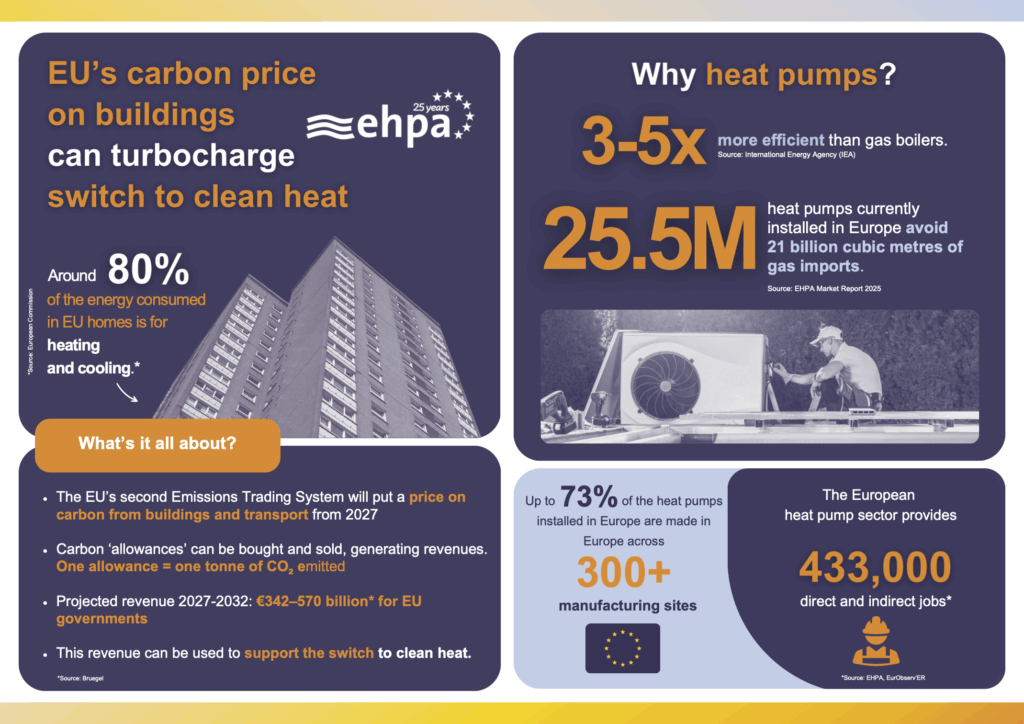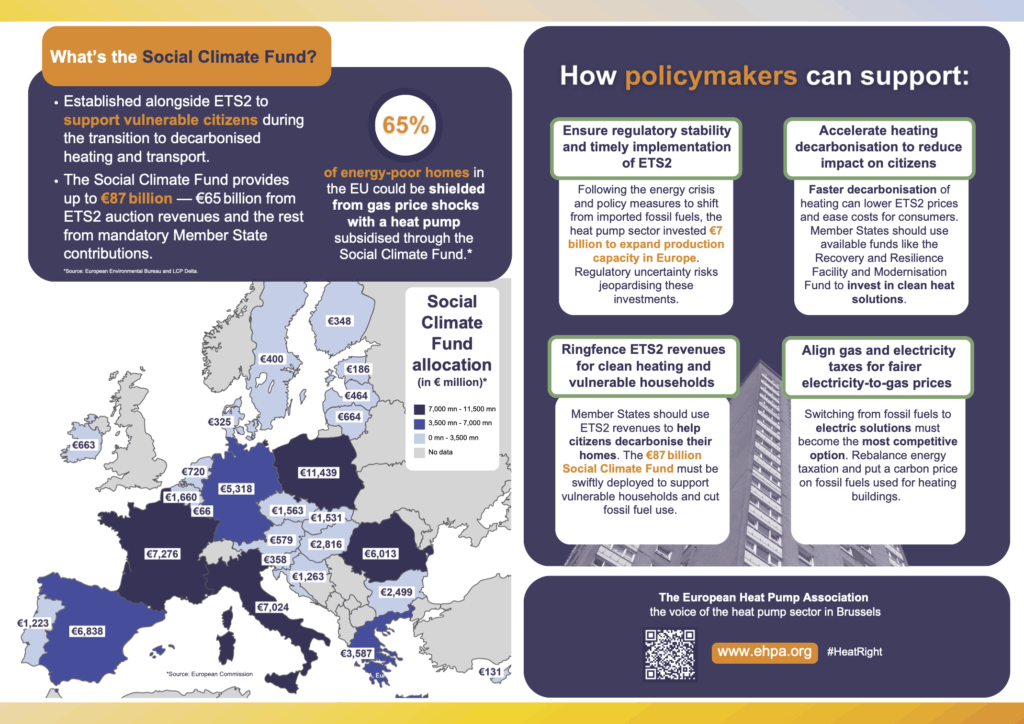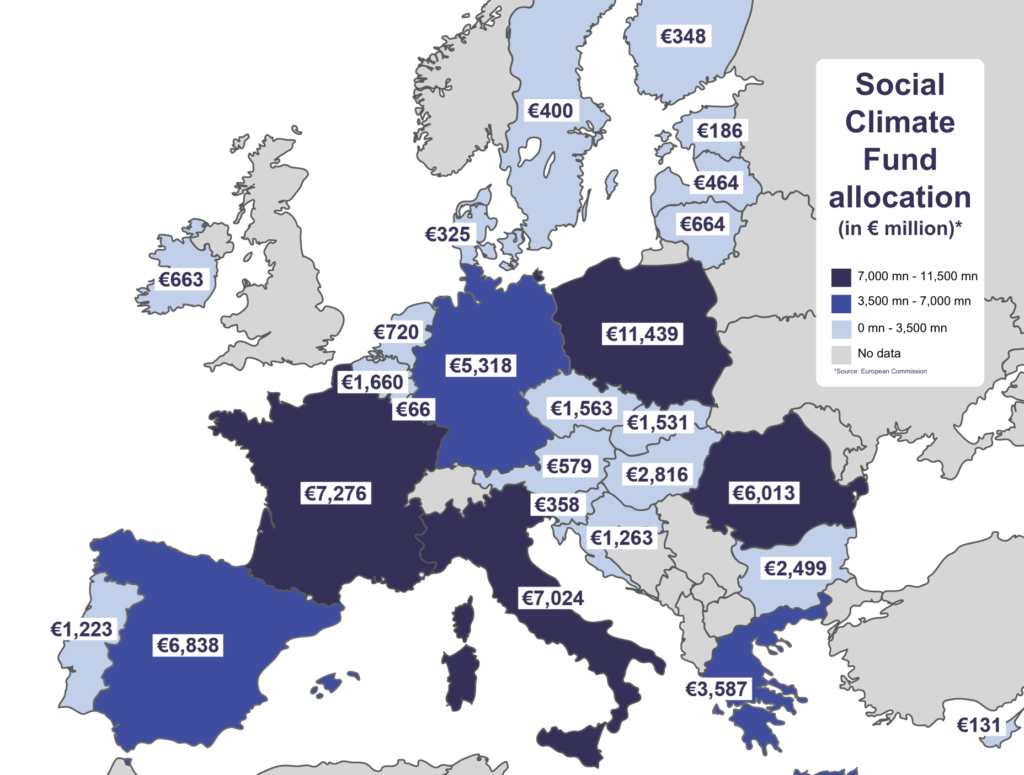From 2027, fossil fuels used to heat our homes will face a carbon cost. The EU’s new Emissions Trading System – known as ETS2 – will begin putting a price on climate-harming carbon emissions from buildings and road transport.
This marks a crucial moment for Europe’s energy transition – and a major opportunity for the heat pump sector.
Fossil fuels used in heating – gas, oil, and coal – have remained untouched by EU-wide carbon pricing, despite their impact on climate change.
ETS2 will change that by requiring fossil fuel suppliers to pay for the emissions their products cause. As a result, fossil heating will become more expensive, while heating with clean technologies like heat pumps will gain a stronger competitive edge.
But the shift won’t happen automatically – and the benefits won’t reach everyone unless governments take swift, smart action.
In response to the energy crisis and growing demand for energy independence, Europe’s heat pump manufacturers have already stepped up.
Over the past few years, the sector has committed €7 billion in investments to expand production capacity across the continent. But this momentum is now at risk. Without timely and stable implementation of ETS2, those investments could be undermined by policy uncertainty.
To make this transition work – for industry, consumers, and the climate – Member States need to act decisively on four fronts.
First, we need regulatory stability and timely implementation of ETS2.
The legislation was adopted in 2023, and Member States were required to transpose it into national law by mid-2024. Some are still lagging behind.
This delay creates uncertainty not just for consumers but also for the manufacturers and installers preparing to scale up clean heating solutions. A clear and stable regulatory framework is essential to safeguard the €7 billion in planned investment and ensure that the sector can deliver on its promise.
Second, Member States must accelerate the decarbonisation of heating.
ETS2 is a market-based system. That means the price households pay will depend on the pace at which emissions are reduced. If fossil heating remains widespread, demand for emissions allowances will stay high, and so will prices. But if governments act now to shift homes away from gas and oil, ETS2 prices can remain manageable.
Member States already have access to substantial resources – including the Recovery and Resilience Fund and the Modernisation Fund – which should be directed toward clean heating technologies like heat pumps.
Third, the revenues raised through ETS2 must be used wisely and fairly.
The system is expected to generate between €340 and €570 billion for EU governments by 2032. A portion of this – €87 billion – will go into the Social Climate Fund, designed to help vulnerable households manage the transition to cleaner heating and transport.
These funds must be spent effectively, not on prolonging fossil fuel use but on future-proof investments like energy-efficient building renovations and the rollout of clean technologies. Direct support to low-income households is essential, but it should enable people to switch away from polluting systems, not lock them in.
Fourth, we need a fairer approach to energy taxation.
Today, electricity is often taxed more heavily than fossil fuels, despite being a cleaner energy source. That distorts the market and makes it harder for households to choose heat pumps and other electric solutions. Governments should shift taxation away from electricity to ensure that cleaner heating becomes not just the right choice, but also the most affordable one.
The introduction of ETS2 is a major step forward for European climate policy. But it will only deliver its full potential if governments move quickly and keep the long-term picture in focus. The heat pump sector stands ready to do its part. The technology is here, the investment is underway, and the benefits are clear – for households, industry, and the planet.
Now it’s up to Member States to match that commitment with sound policy action, targeted support, and a clear signal that clean heating is the future.




